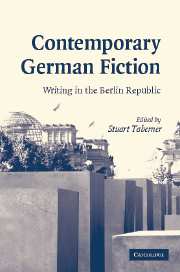Book contents
- Frontmatter
- Contents
- List of contributors
- Acknowledgments
- Note on texts and terminology
- 1 Introduction: literary fiction in the Berlin Republic
- 2 Literary debates and the literary market since unification
- 3 Berlin as the literary capital of German unification
- 4 ‘GDR literature’ in the Berlin Republic
- 5 ‘West German writing’ in the Berlin Republic
- 6 Literary reflections on '68
- 7 Pop literature in the Berlin Republic
- 8 Representations of the Nazi past I: perpetrators
- 9 Representations of the Nazi past II: German wartime suffering
- 10 German literature in the Berlin Republic – writing by women
- 11 Cultural memory and identity formation in the Berlin Republic
- 12 Turkish-German fiction since the mid 1990s
- 13 German-language writing from eastern and central Europe
- 14 Writing by Germany's Jewish minority
- Index
5 - ‘West German writing’ in the Berlin Republic
Published online by Cambridge University Press: 22 September 2009
- Frontmatter
- Contents
- List of contributors
- Acknowledgments
- Note on texts and terminology
- 1 Introduction: literary fiction in the Berlin Republic
- 2 Literary debates and the literary market since unification
- 3 Berlin as the literary capital of German unification
- 4 ‘GDR literature’ in the Berlin Republic
- 5 ‘West German writing’ in the Berlin Republic
- 6 Literary reflections on '68
- 7 Pop literature in the Berlin Republic
- 8 Representations of the Nazi past I: perpetrators
- 9 Representations of the Nazi past II: German wartime suffering
- 10 German literature in the Berlin Republic – writing by women
- 11 Cultural memory and identity formation in the Berlin Republic
- 12 Turkish-German fiction since the mid 1990s
- 13 German-language writing from eastern and central Europe
- 14 Writing by Germany's Jewish minority
- Index
Summary
Writing in September 1990, only a few weeks before the German Democratic Republic (GDR) was set to accede to the Grundgesetz (basic law) of the Federal Republic (FRG), the author Patrick Süskind, best known for his worldwide best-seller Das Parfum (Perfume, 1985), sounded a note of anticipatory nostalgia not for the soon-to-be defunct communist East Germany but for the passing of his comfortably familiar, dependably dull, West German reality: ‘It's true, I feel a little sad when I think to myself that the Federal Republic, that unexciting, unloved, practical little state in which I grew up, will soon no longer exist.’ For West Germans of Süskind's age, born into the aftermath of the war, ‘we forty-year-old children of the Federal Republic’, this was the only system they had ever known. And, although much criticised – most spectacularly in the late 1960s by Süskind's generation of student protesters – what would come to be known as the ‘old’ Federal Republic had been theirs. They had grown up with West Germany, the unloved offspring of the anti-Soviet alliance, fought it, and reshaped it in their image.
Süskind's bout of unification-blues notwithstanding, for most of the 1990s it would be the dramatic transformation of the former East Germany that would prove to be the more compelling focus of media attention and scholarly scrutiny.
- Type
- Chapter
- Information
- Contemporary German FictionWriting in the Berlin Republic, pp. 72 - 90Publisher: Cambridge University PressPrint publication year: 2007
- 3
- Cited by



